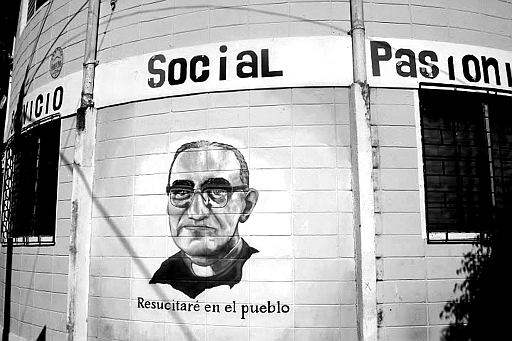Judith Chubb,
Political Science
Reflection
As is reflected
in the questions that follow, I am deep in an "intellectual discomfort zone,"
trying to work through how what we saw and heard in El Salvador relates to my
broader understanding of injustice, violence and peace-building. Visiting El
Salvador twenty years after the peace accords brought an end to the brutal
civil war, I struggle with what "peace" means in a situation like this. I keep
replaying in my mind Oscar Romero's statement that "a just peace isn't the
peace of the cemetery." What is the function of memory in El Salvador? Of
course, it is essential to preserve the memory of what happened for future
generations, and it may have therapeutic value for the victims to have their
pain acknowledged and validated, but I wonder whether public recognition of
martyrs (in symbolic actions like the Monument to Truth or the naming of
Monseñor Romero Boulevard) has become a substitute for justice to the
victims and the survivors. In the absence of perceived justice on the part of
the victims, is meaningful reconciliation possible? Can the society come to
terms with its past and move forward if there is no acceptance of
responsibility and no accountability for the perpetrators (not just physical
but political and moral) of the atrocities? The Truth Commission documented the
victims, but memory and history remain highly contested. Without
accountability, does memory keep open the wounds of the past, preventing the
society from coming together to move forward? And what do history and memory
mean for the new generations that never directly experienced the pain of the
war? Thirty years after the end of the war, would trials or other forms of
accountability serve any purpose or would they repolarize society? Is it better
to close the book on the past and move forward, as the general amnesty
attempted to do?
 |
Recordatorio de Monseñor
Romero, Arzobispo de San Salvador,
asesinado el 24 de marzo de
1980
© Justin Poché, History |
What are the
prospects for building a more just society in El Salvador? The war was caused
by a highly polarized society and the refusal of established elites to consider
any type of political or economic reforms to provide a meaningful voice and
some measure of social justice to the poor peasants who constituted the
majority of the population. After 12 years of war and at least 79,000 civilian
victims, the two parties signed a peace accord, which put in place the
framework for the development of the country up to the present. The war ended,
the troops on both sides were demobilized, opposition parties were allowed to
organize and run for office, basic human rights were guaranteed, the Left even
came to power in 2009. However, the peace accords deliberately sidestepped all
issues of economic redistribution to focus solely on political inclusion, and
the guerrilla forces agreed to a neo-liberal economic structure as a condition
for the end to armed conflict. While democracy and respect for human rights are
certainly fundamental steps forward, does this agreement forestall deeper
social and economic changes in El Salvador? With regard to political power, how
much difference does ideology make if policy options are constrained within the
confines of existing economic structures? How much difference has political
participation made in the lives of those social groups who supported the
guerrillas? The "leftist" government has focused on populist policies like
providing milk, shoes and uniforms for schoolchildren rather than structural
change; it is increasingly trapped between the necessity for political and
economic compromise on the one hand and the frustrated expectations of its
supporters on the other.
Can El Salvador
today be considered a country "at peace" when gang violence has now reaped more
victims than 12 years of civil war? I was struck by the fact that the upsurge
in criminal violence apparently coincides with the signing of the peace
accords. What are the deeper causal factors at work here? Is it just a question
of U.S. deportation of criminals back to El Salvador? Why have criminal gangs
and organized crime found such a fertile terrain among marginalized youth? To
what extent is this a legacy of the failure to settle the social and economic
issues that gave rise to the civil war? Looking at the bigger picture, the
problem is not just the physical violence of the gangs, but the underlying
problems of structural violence (poverty, poor education, poor health care)
which the extreme levels of criminal violence at least in part reflect.
What then are the
prospects for meaningful change? In the absence of a shared public commitment
to change, have the underlying issues of poverty and inequality that drove the
civil war been "resolved" through mass emigration? Given the rather grim
picture of El Salvador's economic, social and human resources with which we
were presented, I find myself wondering if encouraging emigration may be the
most effective anti-poverty tool available to the government. The country needs
massive investment in human resources (especially education), infrastructure
and environmental protection. But where would the money come from? The current
"left-wing" government does not have a solid parliamentary majority, and it is
not even clear if it will remain in power after the next elections. Might
remittances be the most effective anti-poverty tool, because they don't require
sacrifice from existing elites? |